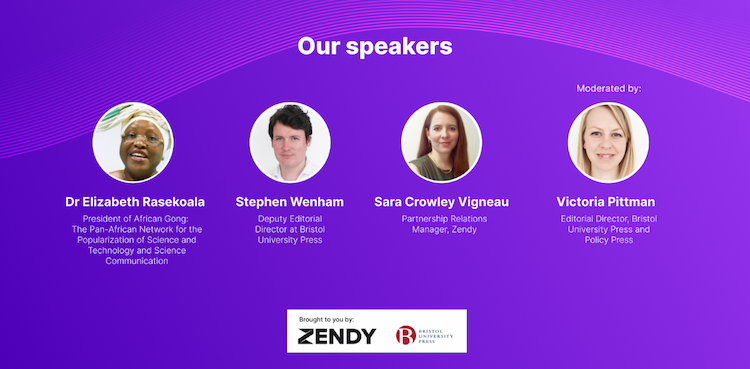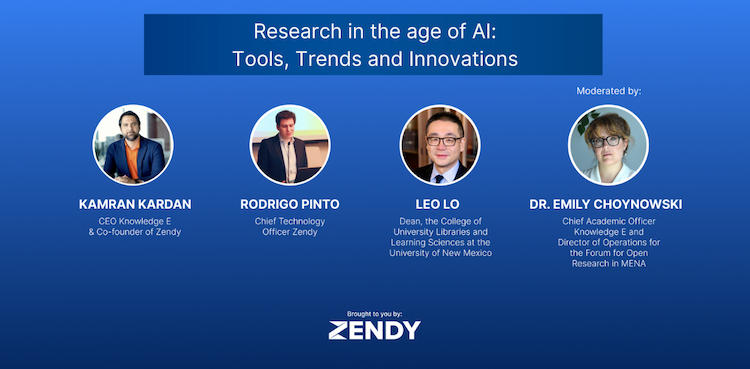Webinar Recap: Navigating AI in Publishing: Best Practices and Use Cases for IP Management, Equity, and Accessibility
Recently, we collaborated with AU Presses to host an insightful webinar titled "Navigating AI in Publishing, Best Practices and Use Cases for IP Management, Equity, and Accessibility". The webinar attracted a diverse audience of researchers, students and academics who wants to learn how to protect and leverage IP, copyright, accessibility, equity and bias through the challenges and opportunities of AI.
Key Highlights and Takeaways
- Engaging in closed AI systems: enabling consent, credit and compensation
In this webinar, our Co-founder, Kamran Kardan, addressed critical questions that researchers are asking regarding the ethical considerations of selecting AI tools. With the growing integration of AI in research, Kamran highlighted the need for transparency into how researchers’ content might be processed or utilised by AI systems.
- Publisher AI use case: IT governance Publisher.
Andreas Chrysostomou, Publishing Relations Manager at IT Governance Publishing Ltd, shared valuable key points about the future of IP for scientific papers within AI. He also highlighted the importance of collaboration between researchers and AI developers to create a more transparent and efficient ecosystem that benefits all.
- AI tools: Enhancing Accessibility and Promoting Equity
Zendy's Chief Technology Officer, Rodrigo Pinto, showcased the potential of AI in making access to knowledge more democratic and inclusive. In this webinar, Rodrigo addressed some of the crucial challenges that come with AI implementation, particularly around ethical and legal aspects, such as copyright protections, regulatory frameworks and bias in AI algorithms.
- GAI: Reducing Barriers to Scholarly Information Access
Lucy Lu Wang, Assistant Professor at the University of Washington Information School, shared how generative AI can simplify and make it easier for non-researchers and practitioners, such as healthcare clinicians, to access scholarly information. Lucy Lu pointed out key challenges, such as knowledge gaps, technical issues and discipline-specific language, and offered practical solutions for bridging these gaps.
The webinar was a great opportunity to engage with experts and discuss the future of open access. We thank AU Presses for the collaboration and all attendees for their valuable contributions.
Stay tuned for more discussions and insights from experts in the field.

Webinar Recap: Supporting the publishing and discovery journey of young and emerging scholars in the Global South
On the 25th of April, Zendy partnered with Bristol University Press to host an insightful joint webinar titled, supporting the publishing and discovery journey of young and emerging scholars in the Global South. The discussion panel was moderated by the Editorial Director of Bristol University Press, Victoria Pittman and featured the President of African Gong, Elizabeth Rasekoala, the Deputy Editorial Director at Bristol University Press, Stephen Wenham and the Partnerships Relations Manager at Zendy, Sara Crowley Vigneau. In this blog, we summarise the contributions of each speaker to the joint webinar. Elizabeth Rasekoala - President of African Gong Addressed key systematic issues within publishing in the Global South Academic research is predominantly published in English, which is not the first language of many in the Global South, hence publishers should be open to accepting research in different languages. Discussed the concept of “helicopter research syndrome” wherein more established researchers allocate data collection tasks to locals in the Global South and monitor their work but don’t credit them in the final academic papers Highlighted the book published by Bristol University Press titled, Race and cultural inclusion: Innovation, decolonization, and transformation. The book had a total of 30 contributing writers. 10 young scholars, 10 seasoned scholars and 10 senior scholars to facilitate emerging scholars get published. Stephen Wenham - Deputy Editorial Director at Bristol University Press Highlighted BUP’s international reach and efforts to work with young authors Bristol University Press has publications that are available globally. In the global south, BUP tries to match the books to the local market. Local distributors receive a discount and local publishers assist in localising the publications and releasing local editions of books Works with sales agents to ensure publications by local authors are highlighted in relevant regions Sara Crowley Vigneau - Partnerships Relations Manager at Zendy Highlighted the relationship between publishers and libraries in advancing access in developing regions Zendy supports scholars in the Global South through offering an affordable global subscription, while also working with publishers to include research generated by researchers in the Global South. Most of Zendy’s global users are aged between 18-34 and 20% of Zendy’s userbase is situated in African countries and territories. Zendy is actively working on “countries in crisis’ initiative where in Zendy works with publishers to make research content free in developing regions Conduct your research on Zendy As a growing AI-powered research library, Zendy is committed to hosting webinars that address important challenges and highlight key initiatives in the world of academia. Head to Zendy’s YouTube channel now to watch all our webinar recordings. Furthermore, take your research to the next level and head to Zendy now to try out our suite of AI tools including ZAIA! ul { margin-top: 5px !important; margin-bottom: 5px !important; } p, ul, li, h1, h2, h4 { word-break: normal !important; }

Webinar Recap: Research in the age of AI - Tools, Trends & Innovations
In a pivotal time where AI-powered tools shape efficiency in research processes, the world of academia is witnessing a significant transformation. This calls for a thorough discussion to define ethical AI usage in order to leverage the technology to improve the landscape of academia. We recently hosted a webinar to address and discuss the usage of AI in research. The webinar titled, “Research in the age of AI - Tools, Trends & Innovations” was moderated by Knowledge E’s chief academic officer, Dr. Emily Choynowski; and featured Zendy co-founder Kamran Kardan, Zendy Chief Technology Officer, Rodrigo Pinto, and Professor Leo Lo from the University of New Mexico. Kamran Kardan - CEO of Knowledge E and Zendy Driving an AI-powered research library [Zendy], ethical usage of AI is a core value. AI benefits and facilitates interdisciplinary research by allowing researchers to quickly learn about areas of study they are not specialised in, which creates productivity and efficiency in research processes. The technology also allows researchers to analyse citations and determine its relevance to their current projects. To tackle the ethical challenges AI presents, Zendy released an AI imperatives statement that guides the direction and intention behind developing AI products. Professor Leo Lo - Professor at University of New Mexico Governments and businesses should invest in developing AI literacy in current education landscape Conducted a survey in April 2023 amongst US academic library employees when Chat GPT was new and found that AI training was required, the employees presented a limited understanding of AI concepts, and that generative AI is not frequently used. Conducted follow-up surveys in December 2023 and found that there was a shift in attitude towards AI. Libraries had implemented AI solutions and applications while actively developing AI literacy initiatives. Developed AI competencies for librarians that tackles the comprehensive understanding, training and analysis required to confidently use AI to streamline library operations and transform services. Rodrigo Pinto - CTO of Zendy Introduction to LLMs: a LLM (Large Language Model) is a type of AI designed to understand and generate human language. This technology has reasoning capabilities, understands questions and reads from external knowledge to respond with insights. Introduction to ZAIA - AI Assistant for research: ZAIA is an LLM developed by Zendy. It was designed to expedite the research process by analysing study results and providing credible responses backed by references. Challenges of AI: bias, reliability, and data privacy. The mitigation strategies deployed by Zendy are safeguards and chains of verification and thought to minimise bias. As AI advances and creates efficiency across different industries, there has been a significant requirement to regulate the use of AI. In our efforts to make research accessible we launched a suite of AI tools on Zendy last year, to ensure ethical usage of our AI technology, we also established a comprehensive list of AI imperatives to guide the development and implementation of AI within our products. Discover academic research and easily consume papers with comprehensive AI tools now on Zendy. div { word-break: break-word !important; } ul { margin-bottom: 0px !important } @media (max-width: 767px) { li { margin-left: 1.5rem; list-style: disc; } p { margin-top: 0.5rem !important; margin-bottom: 0.5rem !important; } ul { margin-bottom: 20px !important } }
Address
John Eccles HouseRobert Robinson Avenue,
Oxford Science Park, Oxford
OX4 4GP, United Kingdom
